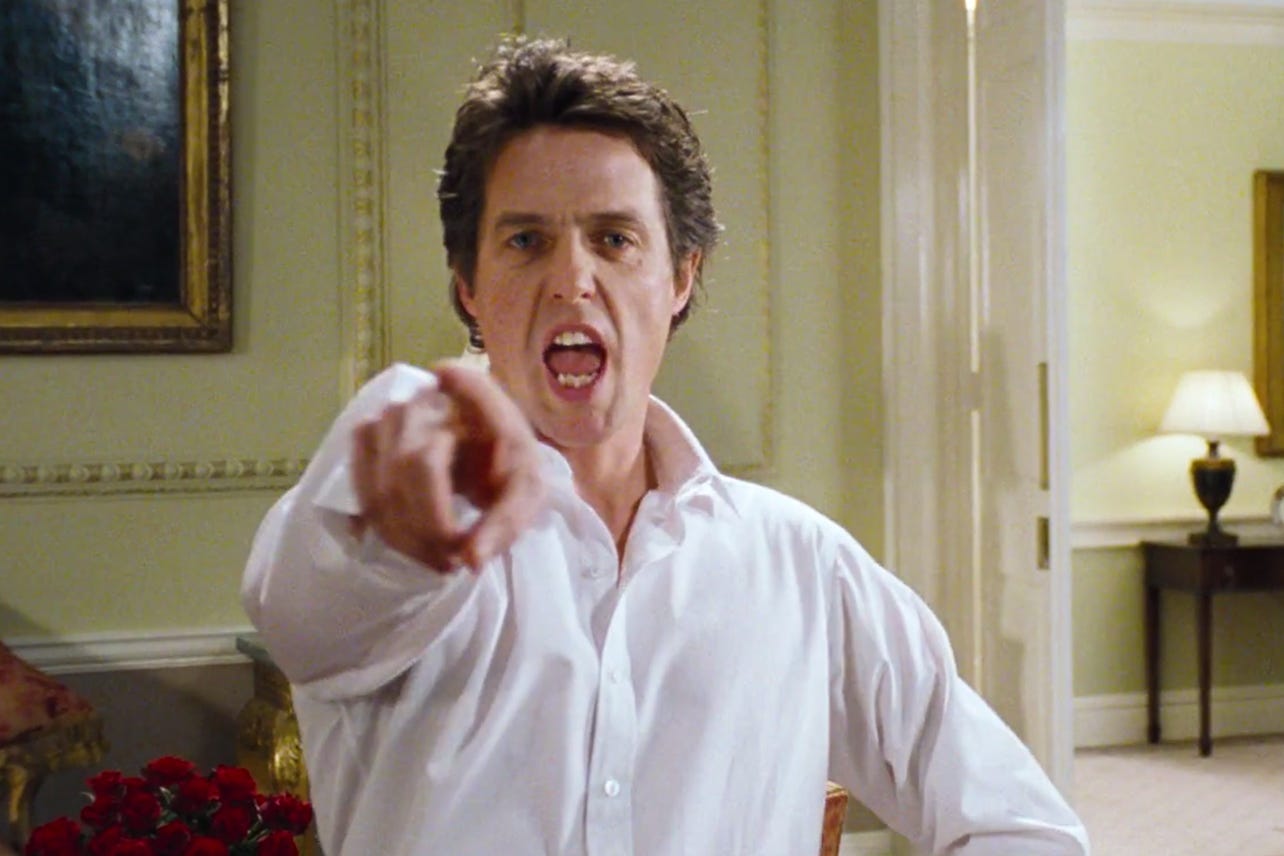VOLUME 9: LOVE, ACTUALLY
“Whenever I get gloomy with the state of cinema, I think about the entrance lobby of the Peckhamplex in South London. General opinion’s starting to make out that we live in a world of jaded viewers and dwindling theatrical audiences, but I don’t see that. It seems to me that cinema is everywhere. Often, it’s not particularly dignified or newsworthy, but it’s always there – licorice pizzas and spice dunes, roosters called Macho and towns called Ennui-sur-Blasé, jets and sharks, vehicular babies, puppet babies, symbiotes. When the coronavirus hit the United Kingdom, as far as I know, none of the discourses on Film Twitter were about love or ordinary topics – they were all discourses of cinema. If you look for it, I’ve got a sneaky feeling you’ll find that kino actually is all around.”
Hugh Grant, probably
Happy holidays, and a warm welcome to Cinema Year Zero volume 9: Love, Actually! At the start of 2021, we were in a state of introspection and melancholy: an end to COVID-19 seemed further away than it ever had done, and CYZ lamented the state of British cinema in our fifth volume, subtitled Pagans. While our opinion on British cinema hasn’t changed (just look at the essays in this very volume!), and the coronavirus is enjoying a resurgence with a new variant, there is no doubt about cinema’s gangbusters return in the summer of 2021, and the riches it brought with it. In the spirit of all these things, we’ve decided to see out the year with a volume of fun, excess, and Anglophobia.
The brief for this volume was to hone in on one performer from Richard Curtis’ 2003 Christmas film, and arguably the most enduring of his illustrious and poisonous career, Love, Actually (the idea can be credited to friends of CYZ, Millicent Thomas and India de Lancy Green). Some contributors have gone after the big names, the white elephants of Love, Actually, if you will. Ben Flanagan is onto Colin Firth’s FBPE lamenes. Others have alighted on bit parts and stars-to-be: Tom Atkinson finds Martin Freeman right as his star is beginning to rise in his best role: Nativity! (2009); and Shelby Cooke excoriates Curtis for the cursed character of Colin Frissell, whose big knob hides even bigger misogyny. More still have opted for the smallest of small roles: Kirsty Asher sings the praises of workmanlike BBC mainstay Nina Sosanya, while Laura Venning expands on the career of Frances de la Tour, whose role in Love, Actually was deemed so inessential that her scene only appears on the DVD release.
But one name seems to hang over this volume like a strange, ambivalent cloud: Hugh Grant. Rose Dymock’s essay on Prime Minister “David” analyses him as an idealised leader for a broken Britain; elsewhere in this volume he is described as a “doomed svengali”; “suave and gentlemanly”; “a sanitised Blair”. What does it say about the state of Britain that, in a state of hopping mad furore about the unfairness of a Downing Street Christmas party, people are agreeing with earnest longings for Love, Actually’s lovestruck Thatcher fetishist to take over from the fascists at the head of government? The Paddingtonisation of Britain continues unabated; is there a light at the end of the tunnel?
For us, that light may well have been the packed turnout for our first CYZ screening: the premiere of Maximilien Luc Proctor’s Srecan Put. Max has written about the film for us in our anniversary volume, so getting the chance to put it in a cinema for the first time, in collaboration with the endlessly lovely people at Screen25, was a beautiful moment. We also produced a zine to be handed out at the event, which brings us to the reason we are able to do what we do: the subscribers over at our Patreon. Without them and their support, we wouldn’t have been able to afford to make the zine, nor would we be in our current position, one where we are able to pay writers for their contributions to Cinema Year Zero. We thank you from the bottom of our hearts.
In a year of milestones, it’s easy to get lost in the flow of work and miss all the great cinema out there. Thankfully, there was so much good new stuff, and digging through film history to do, that any 2021 retrospective would be bountiful with small-scale masterpieces and big crowd-pleasers. To that end, we also present in this volume our poll for the best movies of 2021, and our favourite discoveries of 2021, voted for by contributors to, and friends of, CYZ. Keeping track of votes for the poll in the Google Sheet as the ballots have flown in has been an extreme sport, with various films occupying the top spot for a day or two at a time. Last year, our winner ended up being a resounding victory lap for one film. This time… well, we’ll wait for you to find out for yourself.
Merry Christmas and a Happy New Year to you all!
CONTENTS
Olivia Rose Olson by Maxmilien Luc Proctor
Martin Freeman by Tom Atkinson
Thomas Brodie-Sangster by Digby Houghton
Martine McCutcheon by Anna Devereux
Frances de la Tour by Laura Venning
Billy Bob Thornton by Isaac Parkinson
Cinema Year Zero is volunteer run. Our goal is to pay writers a fair fee for their work. So if you like what you find at Cinema Year Zero, please consider subscribing to our Patreon!



